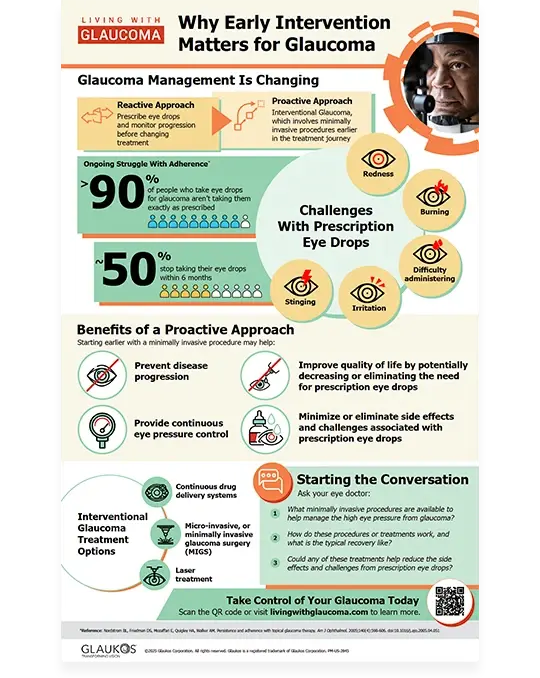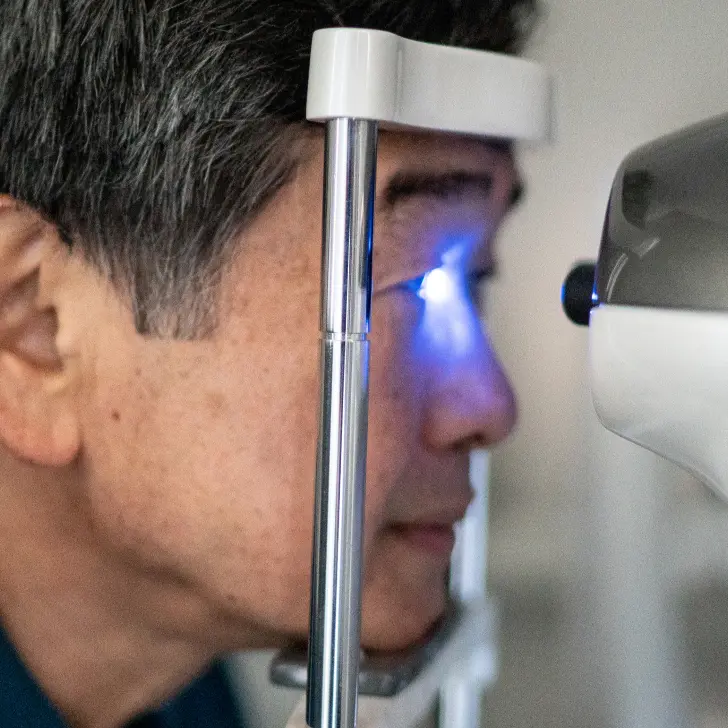
Managing your glaucoma
Glaucoma management is evolving—from the approach to treatment to the types of treatments available. Now, a new perspective called Interventional Glaucoma, which involves invasive procedures, is changing the way eye doctors and patients treat, manage, and think about glaucoma. There are even certain lifestyle practices that people living with glaucoma can do as part of their daily treatment journey to help further manage their glaucoma symptoms, slow their disease progression, and improve their quality of life.
A new approach with Interventional Glaucoma
A new way of thinking about glaucoma management is here—a shift from reactive to proactive. Although prescription eye drops are effective and the most common treatment for glaucoma, they can cause challenges and unwanted side effects, including:
Redness
Irritation
Burning
Stinging
Difficulty putting them in the eye
Research has shown that more than
90%
of patients who take drops for glaucoma aren’t taking them exactly as prescribed.
and nearly
50%
stop taking their medications within 6 months.
Interventional Glaucoma means being proactive
This new proactive perspective on treatment, known as Interventional Glaucoma, means that glaucoma is no longer a “watch and wait” disease—that is, a disease that involves eye doctors waiting until there is evidence of disease progression before changing treatment. Proactive glaucoma management practices have given rise to earlier use of minimally invasive procedures, such as drug delivery systems and micro stents. These procedures are not only enabling earlier treatment; they also have the potential to reduce reliance on prescription eye drops, while helping to prevent disease progression.
A proactive vs reactive approach to glaucoma treatment—what’s the difference? View a side-by-side comparison to expand your knowledge of these two approaches to glaucoma treatment. Understand the difference: proactive vs reactive
Discover why early intervention matters for glaucoma
In this 1-page infographic, learn how glaucoma management is changing—from a reactive approach with prescription eye drops, to a proactive approach with Interventional Glaucoma treatment options.
View the early intervention infographic
Importance of earlier treatment
Glaucoma is an irreversible disease—once vision is lost, it cannot be recovered. If left untreated, glaucoma can ultimately cause blindness. That’s why, when it comes to detecting and treating glaucoma, the earlier, the better.
Regular eye exams, including specific glaucoma tests, are important for the early detection and diagnosis of glaucoma. If diagnosed early, an eye doctor can recommend a minimally invasive procedure to manage glaucoma and help prevent loss of vision.
Have an upcoming eye appointment? To help you prepare for your appointment, here is a resource guide to help you talk with your eye doctor about glaucoma treatments. Prepare for your next appointmentLifestyle practices to help manage glaucoma symptoms
If you’re living with glaucoma, there are lifestyle practices that may help you manage the high eye pressure associated with glaucoma and maintain your desired lifestyle. Here are some examples of lifestyle practices DOs and DON’Ts:
DO
- Keep your head elevated (above the heart), even while sleeping
- Aerobic/cardiovascular exercises—such as walking, jogging, biking, pickleball
- Consume a healthy diet—foods like berries, red onions, lentils, spinach, and dark chocolate contain nutrients that have been shown to help prevent glaucoma disease progression and increase blood flow to the optic nerve
- Practice mental/emotional well-being—examples include gentle yoga, breathing exercises, and meditation to lower stress, increase blood flow, and reduce high eye pressure
DON’T
- Perform activities or assume positions that involve having the head below the heart for an extended period—examples include headstands, certain yoga positions (such as downward-facing dog)
- Engage in activities that restrict exhalation or require holding your breath—such as playing wind instruments or lifting heavy weights
- Consume foods that are high in saturated fats, trans fats, and refined carbohydrates (such as commercial baked goods and microwaved popcorn); or have excessive amounts of red meat, processed meats, and caffeine
- Smoke, vape, or chew tobacco
Glaucoma can impact many aspects of your life, but it shouldn’t stop you from enjoying your favorite activities. If you have questions or are unsure about a specific activity, it’s always best to speak with your eye doctor directly to learn more.
How you can stay active with glaucoma
A glaucoma diagnosis can be overwhelming and unexpected, but it should not prevent you from living a fulfilling and active life…Read more
Note: The information provided is for educational purposes only and does not constitute medical advice. All treatments have risk. Discuss the benefits and risks with your eye doctor to decide the best treatment for you.